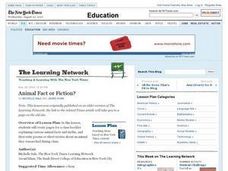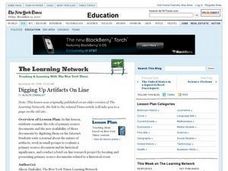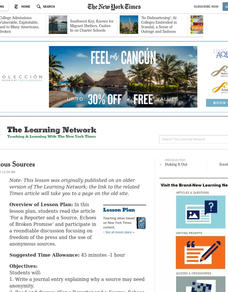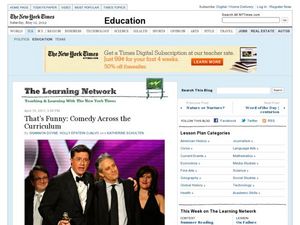Curated OER
Creature Seekers
Does it actually exist? Consider the sighting of a giant squid, much like the one that appears in 20,000 Leagues Under the Sea. Middle and high schoolers read the article One Legend Found, Many Still to Go, and research other mysterious...
Curated OER
Who Could Have Been Who
Can word choice affect a candidate's likeability? Use a New York Times lesson to explore how a presidential candidate's likeability factor can fluctuate in public opinion polls. Young readers choose a presidential election from their...
Curated OER
Black Power
Use this New York Times activity to research contemporary leaders in the African-American community. After reading the article "Blacks Weigh the Impact of the Post-Jackson Years," middle and high schoolers discuss the varying viewpoints...
Curated OER
"Golden" Years?
The Golden Years? Upper graders may think retirement is a long way off, but in life everything is just around the corner. They consider what it means to retire and the current trend of parents working for their Students. They research...
Curated OER
Animal Fact or Fiction?
Read and discuss the article "Welcome to Cicadaville (Enter at Your Own Risk)" to gain a better understanding around the confusion regarding cicadas and locust swarms. In groups your young analysts research statements about animals to...
Curated OER
Dictating the Future
Read the article "Bush Lays Out Goals for Iraq: Self-Rule and Stability" and examine the keys points from President Bush's speech. Whether presented in written text or as an audio bite learners will work in groups to research world...
Curated OER
What a Relief!
How are disasters addressed by the Federal Government? This New York Times lesson, based on the article "Disaster Aid: The Mix of Mercy and Politics," prompts middle schoolers to discuss the idea of using a disaster declaration as a...
Curated OER
Family Life
What is family? Challenge your scholars to write an encompassing definition of what this word means to them. After reading "It May Be a Family Matter, But Just Try to Define Family," class members discuss the emotional issues surrounding...
Curated OER
Whose Rite Is It?
The class explores and debates, from multiple perspectives, a petition to allow Hopi Indians to take golden eagle hatchlings from a federal wildlife sanctuary for use in a religious ceremony. Pupils defend their personal views on the...
Curated OER
Pop Tops
Get your class primed for a comparative analysis lesson with this activity. They compare and contrast their music preferences to those of their classmates. After reading an article, they identify current trends in popular music, analyze...
Curated OER
Digging Up Artifacts On Line
Why is it important to preserve historical documents and artifacts? Examine the role of primary source documents and the availability of these documents on the Internet. Middle and high schoolers write a journal about the nature of...
Curated OER
Bombs Away!
Examine the different perspectives on the future of United States Navy bombing exercises taking place on Vieques, Puerto Rico with this lesson from The New York Times. Here, young learners read "Islanders to Vote on Vieques Bomb Drills,"...
Curated OER
Good for Goodness Sake?
After discussing their opinions of performing community service, young learners read an article about different benefits of serving the community. They participate in a debate about whether their school should require pupils to perform...
Curated OER
Anonymous Sources in the Media
When do people ask for anonymity? Why? After reading the New York Times article "For a Reporter and a Source, Echoes of Broken Promise," young readers participate in a roundtable discussion focusing on freedom of the press and the use of...
Curated OER
Heeding Advice
Compare and contrast various foreign perspectives on the George W. Bush administration's plans for military action. Middle schoolers read the article "Blair and Chirac Head to U.S. to Talks and a Show of Unity." Then, they analyze...
Curated OER
SWOT Teams: Analyzing the Political Parties for the 2010 Midterm Elections
What are political parties and what so strategists do? In this political analysis lesson, students analyze political strategies to understand their strengths and weaknesses. They use key details from the text to learn how to create...
Curated OER
Comedy Across the Curriculum
The New York Times Learning Network provides the resources that permit pupils to examine and then write and perform a fake news broadcast in the vein of “The Daily Show” or “Saturday Night Live” Weekend Update. The generated reports...
Curated OER
Film Festival: Documentaries for Hispanic Heritage Month
In honor of Hispanic Heritage Month, the New York Times provides links to five short documentary films depicting Hispanic themes and culture. Learners can click on each embedded link to view the films, then answer each set of related...
Curated OER
Examining the Form and Function of Campaign Speeches
An examination of stump speeches, one of the most important components of a presidential campaign, is made possible by accessing The New York Times Learning Network. After closely examining the form and function of stump speeches,...
Curated OER
Greed is Good?
From Mr. Merdle to Mr. Madoff? A viewing of the PBS adaptation of Charles Dickens’ “Little Dorrit” launches an examination of greedy characters in literature and a study of greed, unfairness, and economic hardship today. The richly...
Roy Rosenzweig Center for History and New Media
Immigrant Discrimination
For a class learning about Chinese and Irish immigration in America, here's a great starting lesson plan. It has your critical thinkers examining song lyrics, the Chinese Exclusion Act of 1882, and a political cartoon, and finally...
The New York Times
Writing Fiction Based on Real Science - NYTimes.com
Refuse to alienate your scientific-minded young scholars during your creative writing unit. Learners explore how literary writing can reflect observable fact, and be based in actual science. The links include examples of fiction and...
Curated OER
Activism or Slacktivism? The "Stop Kony" Campaign as a Teachable Moment
Engage your learners in global events. The makers of the film Invisible Children began the Kony 2012 Campaign to bring awareness to the Lord's Resistance Army. You can show your class the video Kony 2012 and spark discussion with the...
Curated OER
'Hunger Games' Science: Investigating Genetically Engineered Organisms
In The Hunger Games novel and movie, a futuristic, dystopian society is the setting. In it, a genetically engineered bird escapes control of the government. Using this as a starting point, teenagers examine the realistic possibility of...

























